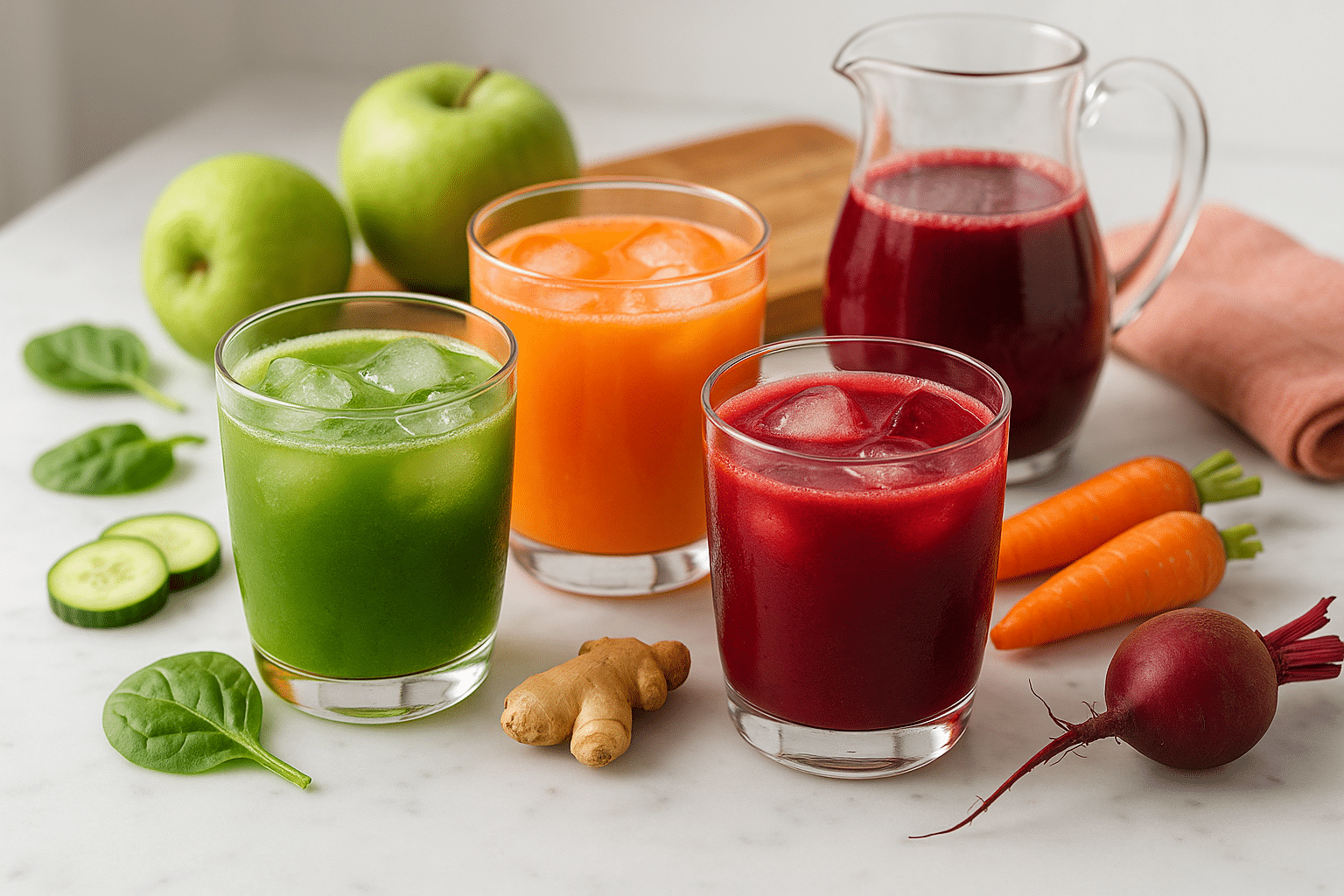It’s been one of those toddler-full days. I’m in my Asheville kitchen, kid humming, and I reach for juicing recipes for gut health because they save my mood and my belly. I want bright flavor, not a green-lawn sip. So I keep things real and quick.
I’ll share short steps, smart storage tips, and everyday ingredients. No juice cleanse drama here—just balanced choices to improve gut health and keep meals satisfying. I also note blood sugar and the role of fiber since the pulp holds most of it.
These drinks help me add more fruits vegetables fast. They support my immune system and overall health. Expect simple tools, tiny swaps, and flavor-first fixes you can do between school pickups.
Grab a glass. We’ll make quick blends that taste good and fit messy life—sticky hands and all.
Key Takeaways
- Simple, tasty juicing recipes for gut health that work for busy parents.
- Short steps, real storage tips, and everyday ingredients.
- No cleanses—focus on balance and fiber awareness.
- Quick ways to add fruits and vegetables and support the immune system.
- Flavor-first tweaks to keep this doable and fun.
Introduction: My cozy kitchen guide to juicing recipes for gut health
Even on my busiest evenings, a fresh glass brightens the mood and the meal. When dinner runs late and patience runs thin, I reach for a quick juice that tastes like summer and fixes the crankies. So here’s how I do it—short, silly, and sensible.
Storytime
Once, after a toddler meltdown and a spilled bowl, a bright glass rescued dinner vibes. It’s fast. It’s pleasing. It gives a real lift without turning on the oven.
What you’ll get
I show quick how-tos, flavor tweaks, and the one tool I actually use. No gatekeeping. Zero fuss. You’ll learn to mix fruits vegetables to stretch vitamins and minerals without overdoing sugar.
Keyword pathway
My plan: digestion support, steady energy, and immune health perks from mixed produce. Mixed drinks often deliver a broader mix of antioxidants and micronutrients. Start small—one glass, a handful of greens, a squeeze of citrus. Flexible swaps save money and time.
Want a few simple juice ideas? Check this link: simple juice ideas. Come stand with me at the counter—let’s make a bright sip and keep the sink clear(ish).
Part One: Juicing basics the way I actually use them at home
When life gets busy, I opt for a crisp, easy drink that lifts energy fast. I run fruits and vegetables through my machine, the liquid into a glass and the pulp in a catcher. That pulp holds most of the fiber.
What is juicing? The quick, no-jargon version
Juicing separates liquid from solids. You sip a bright, light drink and still get many vitamins minerals. It’s perfect when you want flavor without chewing.
The pulp truth: fiber loss, blood sugar levels, and smarter sips
Without fiber, sugars absorb faster and can raise blood sugar. Pair a juice with protein or nuts to steady that spike. I often drink mine before a walk—movement helps my energy stay even.
- Quick habit: stir a spoonful of pulp into soups or add it to baked goods.
- Tip: blend when you want more fiber; juice when you want a crisp sip.
- Reality check: think of this as a colorful side, not your whole diet.
| Option | Fiber | Best use |
|---|---|---|
| Juice | Low | Morning boost, quick vitamins minerals |
| Whole fruits vegetables | High | Meals for fullness and steady blood sugar |
| Blended | Medium | When you want texture and more fiber |
The now of juicing: present-day trends, tools, and a realistic mindset
These days I keep my approach simple: mostly vegetables, a little fruit, and a no-fuss cleanup. That 80/20 idea keeps sugar levels steady and lets you enjoy the benefits without overdoing sweetness.
Why 80/20 works
Think of a plate in a glass. Aim for roughly 80% greens and veg, 20% fruit for lift. I often do greens + cucumber + citrus + a thin slice of apple. It tastes bright and stays balanced.
Choosing a juicer you’ll use daily
Cold-press (masticating): smooth output, gentle on greens, less heat and oxidation.
Centrifugal: fast, great for busy mornings but may oxidize quicker.
| Type | Speed | Best for |
|---|---|---|
| Cold-press | Slow | Leafy greens, long-lasting color |
| Centrifugal | Fast | Quick fruit and hard veg |
Make-ahead and storage
Fill jars to the top to cut air. Store airtight in the fridge and drink soon—most juices keep 24–48 hours; some hold up to 72 if cold-pressed. If browning starts, add lemon and drink first.
- Cleaning truth: the best machine is the one you actually rinse—easy parts = daily use.
- Variety tip: rotate greens and roots to mix vitamins and minerals.
Part Two: Health benefits you can taste in every glass
I love that a quick sip can add real nutrients and a flavor lift to a busy morning. A mixed glass delivers a neat dose of vitamins and minerals that your body uses every day.
What shows up in that colorful cup:
- Vitamins, minerals, and antioxidants that support digestion and daily function.
- Vitamin C and leafy greens that cheer on your immune system.
- A broader antioxidant profile when you mix fruits and vegetables—more colors, more protection.
Studies link mixed fruit-and-vegetable drinks with modest cardio benefits like lower blood pressure and improved lipid markers. That’s a real perk you can sip.
Small note: prune juice is an outlier with more fiber—about 3 g per 8 oz—so it can actually add bulk where many juices do not.
Keep it simple: daily, small portions beat rare mega-glasses. Pair a drink with protein or a snack to steady blood sugar. Rotate colors and ingredients—citrus brightens, ginger warms, beets add depth—and you get a wider variety of nutrients and better flavor.
Want more on inflammation and thoughtful blends? Check this practical guide: juicing for gut health inflammation.
Gut-loving all-stars: ginger, aloe, and friends that calm and balance
I keep a jar of sliced ginger and a small bottle of aloe in the fridge—tiny helpers that change a drink fast. These simple ingredients add flavor and practical benefits without fuss.
Ginger for bloat and flavor balance
Ginger packs antioxidant compounds and may ease bloating and gas. I grate a thin thumb-sized piece into a glass. It brightens the mix and gives nice flavor balance when greens taste too earthy.
Aloe vera for soothing the gut lining
A splash of aloe vera juice calms a touchy stomach. I keep it mild—just a small amount so the drink stays fresh-tasting and soothing.
Beetroot juice for blood flow and gentle stamina
I reach for beetroot juice before a walk. The nitrates support blood flow and gentle stamina. Color-wise, beet plus berries makes a deep, cozy red that tastes tangy and layered.
Apple pectin for good gut bacteria
Green apple brings pectin that feeds beneficial microbes. I toss a slice into most blends when I want a little fiber and natural sweetness. It also boosts vitamins and pairs well with citrus and leafy greens.
- I grate or slice ginger into most drinks—small piece, big payoff.
- I add aloe to cucumber blends when my belly is grumpy.
- I keep ingredients simple and easy to find—makes daily use realistic.
Sugar smarts: keeping juices friendly to your system
Keeping sugar in check is as much about timing as it is about what you toss in the chute. I aim to sip thoughtfully so my energy stays steady and my mornings stay kind.
Pairing produce to steady blood sugar
Without fiber, sugars absorb fast and can nudge your blood sugar up. I pair a small glass with protein—think a hard-boiled egg or a scoop of Greek yogurt—to slow that climb.
My go-to trick: follow the 80/20 rule—mostly vegetables, a splash of fruit. That mix keeps sugars moderate and adds volume without a big spike.
Portion size, timing, and natural sweetness from green apples
I keep portions to 8–12 ounces. Small sips mean fewer quick sugar hits and a calmer system overall.
Timing matters. I drink earlier in the day or around movement—my body handles a small glass better then.
I reach for green apple when I want natural sweetness. It’s tart, crisp, and gentler on blood sugar than sweeter apples.
- I keep portions small—8 to 12 ounces—so my blood sugar stays happy.
- I pair a juice with a hard-boiled egg or Greek yogurt; protein steadies the ride.
- I lean on the 80/20 rule: mostly veggies, a bit of fruit, better for blood sugar levels.
- I reach for green apple for natural sweetness—tart, crisp, and easier on sugar than sweeter varieties.
- I time juice earlier in the day or around movement; my system handles it better then.
- I love citrus and cucumber to add volume without a sugar bump.
- I go heavy on herbs—mint, basil, parsley add flavor without extra sugar.
- If I feel a crash, I shorten portions and add more greens next time.
- Some days I sip half and save half—flexibility wins.
| Portion | When to drink | Pairing | Why it helps |
|---|---|---|---|
| 8 oz | Before a walk or in the morning | Hard-boiled egg, nuts | Limits sugar spike; protein steadies glucose |
| 12 oz | With breakfast | Greek yogurt or cottage cheese | Balances absorption; adds satiety |
| 6 oz (small) | Snack time | Half a toast with nut butter | Gentle lift without big blood sugar changes |
| Split cup | Save half for later | Keep chilled in a sealed jar | Reduces total sugars in one sitting |
Want a quick read on safe practices? Check this expert juicing FAQ from Mayo Clinic. Small tweaks beat strict rules—listen to your body and adjust your diet gently.
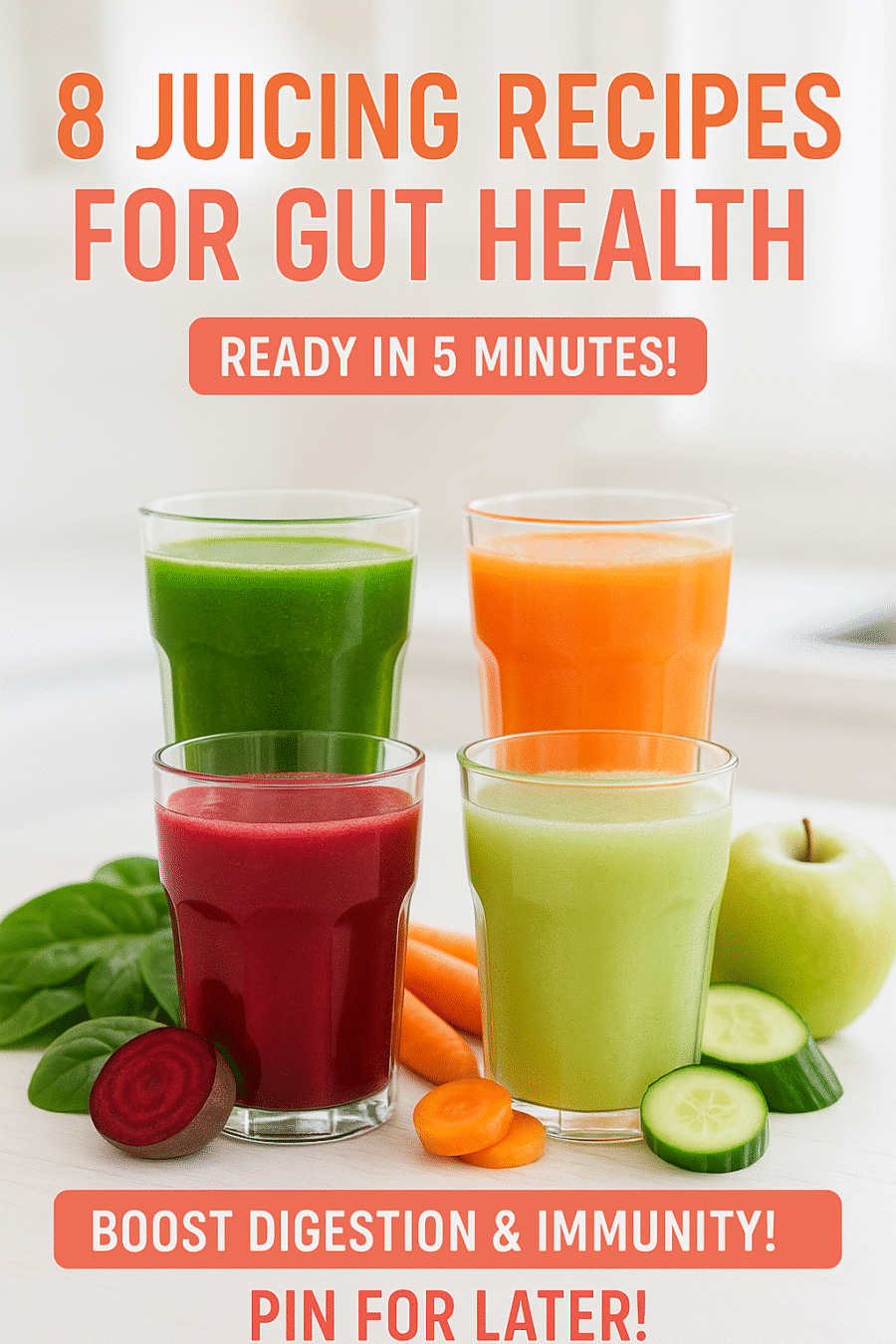
Part Three: My favorite listicle of juicing recipes for gut health
These quick blends are my weekday lifesavers—easy swaps, zero drama. I tee up each mix with a short spotlight and a tiny method you can actually do between school drop-off and emails.
Why mixed blends win: combining fruits vegetables gives a wider range of antioxidants and micronutrients. I keep most blends veggie-forward to manage sugar and make them feel like a real side, not a dessert.
- I use common market picks—spinach, carrots, apple, cucumber—so you can grab what’s on sale.
- Seasonal swaps work great: frozen berries in winter, melon in summer.
- Keep cleanup simple—line the pulp bin, rinse parts right away, and you’ll use the machine more.
- Texture tips: lemon sharpens, mint cools, ginger warms—small add-ins, big change.
- Start with 8 ounces and test how you feel. I often split a cup and save half.
- Mix colors each week—greens, orange carrots, ruby beets, sunny citrus—for variety and benefits.
- This one’s saved my week more than once—especially on Monday mornings.
Below is a quick comparison to help you pick a starting cup. Use it as a simple guide when you’re in a hurry.
| Blend | Main benefits | Easy swap | Best time to drink |
|---|---|---|---|
| Green Spin Boost | Low sugar, vitamin C, leafy nutrients | Swap pear for apple | Morning or pre-walk |
| Carrot Citrus Glow | Beta-carotene, bright flavor | Use blood orange in winter | With breakfast |
| Beet Berry Lift | Antioxidants, circulation support | Frozen berries if fresh scarce | Pre-exercise |
| Cucumber Mint Chill | Hydration, calming flavor | Swap honeydew for summer melon | Afternoon refresh |
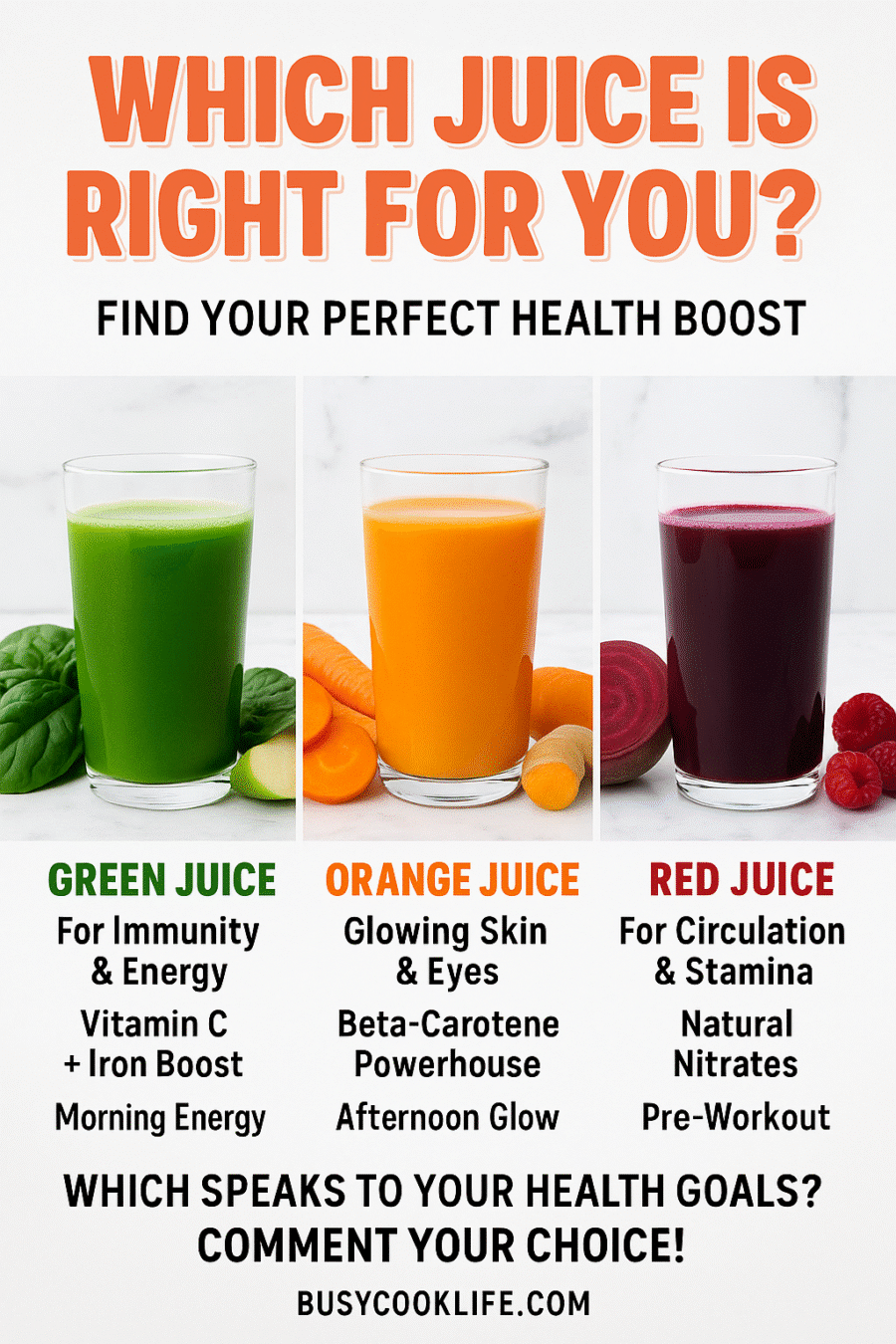
Green Apple Spinach Booster for immune health and digestion
This green glass is my go-to when I need a quick immune boost and a calm stomach. It’s brisk, bright, and easy to make between tasks.
Ingredients spotlight
Spinach gives vitamin K, A, and folate. A single green apple adds vitamin C and a tart lift. A couple pineapple chunks bring sweetness, while lemon keeps color fresh and sharp.
Quick method and flavor tweaks
I run spinach, a green apple, two pineapple chunks, and a squeeze of lemon through the juicer. Pour into a small glass and sip slowly.
- Add ginger when I want warmth and to reduce bloating — just a thin slice to start.
- Toss in fresh mint when I want a cool, spa-day vibe.
- I keep portions small — lively, not heavy — and serve over ice on hot days.
“A crisp, green cup can do more than taste good — it steadies my morning and boosts my day.”
| What | Why | Storage |
|---|---|---|
| Spinach + green apple | Vitamins, minerals, gentle sweetness | Drink fresh or seal and chill up to 24 hours |
| Pineapple + lemon | Antioxidants, tart balance, color protection | Keep airtight; use next day only if very cold |
| Ginger / fresh mint | Bloat relief or cooling finish | Add fresh before serving |
Quick note: This juice recipe is a small, immune health–minded pick-me-up. I save a second serving only if it’s sealed tight and chilled.
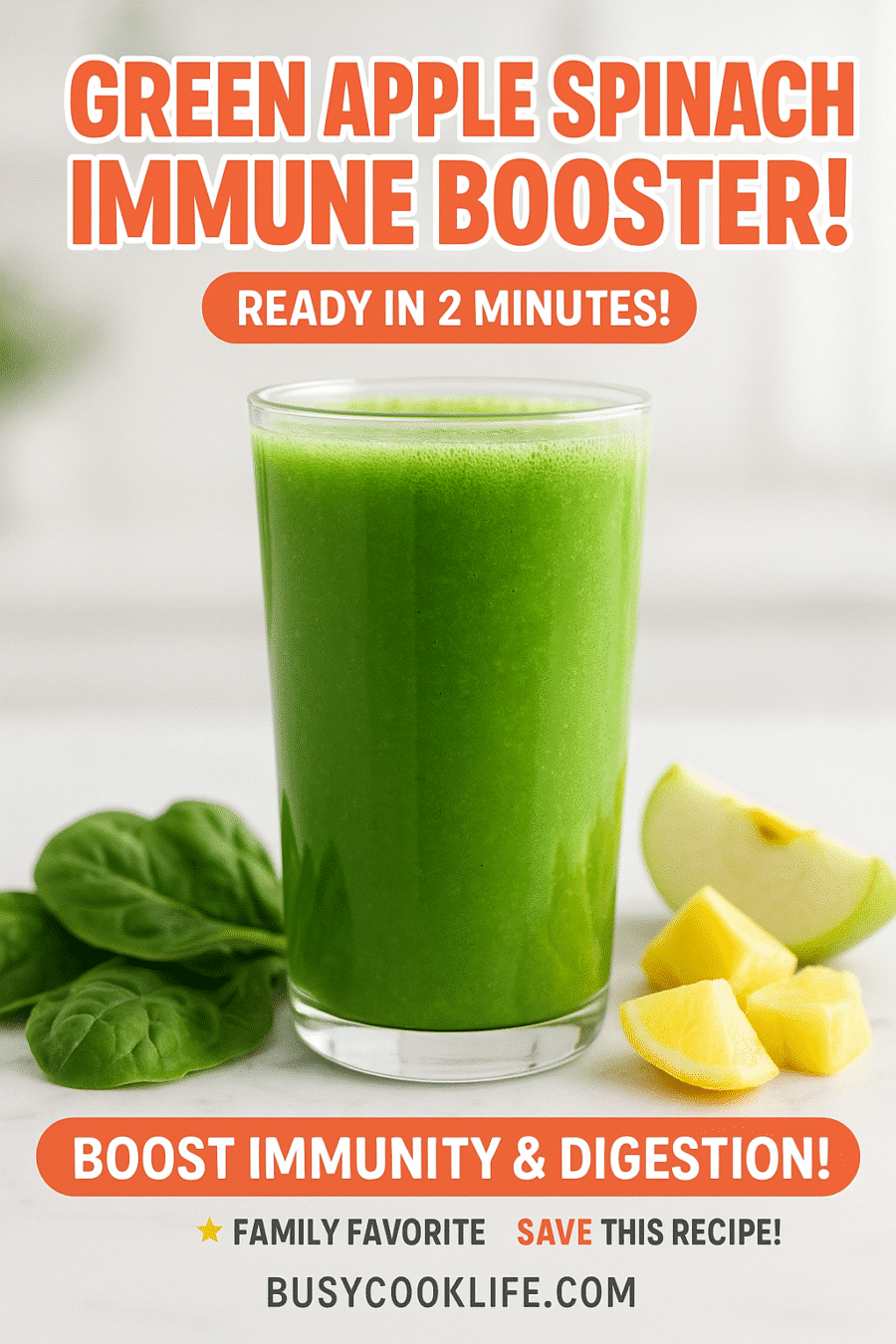
Carrot Ginger Glow for bloat relief and eye health
Bright orange always wakes my kitchen — and my mood — before coffee. This small cup pulls together sweet carrot, a pinch of ginger, and a hit of citrus. It’s quick, cheerful, and easy to sip on the run.
Ingredients spotlight
Carrot brings beta-carotene that converts to vitamin A and supports eye health.
Ginger adds a warm bite and antioxidants that can ease bloating. Orange and lemon add vitamin C and a bright finish.
Quick steps
- I juice carrots first so the sweetness leads, then orange, lemon, and a thin slice of ginger.
- Keep the mix about 80/20 — more carrot than orange — to balance sugars.
- Pour over ice, garnish with a lemon wheel, and pair with a small protein snack.
“A sunny glass like this is a simple way to add vitamins and color to a busy morning.”
| Ingredient | Main benefit | When to sip |
|---|---|---|
| Carrot | Beta-carotene → eye health, vitamins | Morning pick-me-up |
| Ginger | Antioxidants, soothes bloating | After a heavy meal |
| Citrus (orange, lemon) | Vitamin C, bright flavor | Anytime for sparkle |
Make a half-batch if you want kid-size cups — they love the color. Rinse the juicer right away; carrot color sticks fast. If you want a quick breakfast pairing, try this with my morning mug recipe.

Beetroot Berry Balance for circulation and antioxidant variety
A single glass of beet and berry brightens my afternoon and gives a gentle pep. Beetroot juice brings nitrates that link to better blood flow and light stamina. Berries add antioxidants and a softer sweetness that helps steady natural sugars.
Ingredients spotlight
Beetroot, strawberries, raspberries, and a wedge of lemon make a deep, tangy cup. The mix delivers vitamins and color from a few simple fruits vegetables. I call it a small celebration in a jar.
Flavor tip: a squeeze of citrus for tart-sweet harmony
Lemon sharpens that earthy beet note and gives clear flavor balance. I add extra lemon when the beets feel too heavy—works every time.
- I run beet, strawberries, raspberries, and lemon—deep red, tart-sweet, and bold.
- I reach for beetroot juice when I want a gentle stamina boost for an afternoon walk.
- I count on berries for antioxidant variety and a softer sweetness.
- I add extra lemon for flavor balance—keeps it bright and not earthy.
- I keep portions smaller; this blend is rich and satisfying.
- I serve it chilled; the flavor blooms when it’s cold.
- I pair it with a handful of nuts to keep the sip balanced.
- I rotate berries—blackberries work great here, too.
- I stir well if I store it; pigments settle over time.
- I smile every time—the color looks like a celebration.
“This bright cup gives a little lift and a lot of color—easy to make and even easier to enjoy.”
Cucumber Apple Mint Cooler for hydration and calm
On hot afternoons I reach for a chilled cucumber apple mint cooler—instant calm in a glass. I juice cucumber, a green apple, and a handful of fresh mint. It’s a spa-like sip that feels small and restorative.
Why it works: cucumber gives hydration plus vitamin K, vitamin C, and potassium. Mint adds antioxidant lift and a cooling finish. Green apple brings tart, moderate natural sweetness that keeps the cup crisp.
Method is tiny: run ingredients through the machine, add plenty of ice, and squeeze a bit of lemon if you want more lift. I sip this after a walk or on a busy afternoon. It pairs nicely with a small snack so it lands gently.
- I lean on cucumber as the soft, clean base.
- Mint calms the palate and clears the head.
- I make extra and seal it tight—this one holds up overnight in the fridge.
“A chilled glass like this is my quick, low-fuss way to hydrate and reset.”
| Ingredient | Main benefit | Best time |
|---|---|---|
| Cucumber | Hydration, vitamins, potassium | After a walk |
| Green apple | Tart flavor, natural sweetness | Afternoon |
| Fresh mint | Cooling antioxidants | Anytime |
Citrus Celery Refresher to support immune health
A cold, tangy sip can be the easiest tiny boost to toss into a rushed morning. I keep this mix bright and simple—orange, celery, and cucumber. It tastes sunny and feels balanced.
Ingredients spotlight: orange, celery, cucumber
Orange brings a solid dose of vitamin C, a potent antioxidant that helps the immune system stay sharp.
Celery adds vitamin K, folate, and potassium—those minerally notes that give the cup a crisp backbone.
Cucumber mellows the mix and boosts hydration while adding a touch more vitamin C.
- I juice orange, celery, and cucumber—zesty, green, and super sippable.
- I sip this during sniffle season for immune system support and bright flavor.
- I prefer it extra cold—ice makes the flavors sparkle; a pinch of salt lifts the citrus.
- If I run out of oranges, lime works great and still plays bright.
- I store it only for a day—citrus is best fresh. For celery ideas, see this celery guide.
“This mix is small, quick, and full of vitamins and minerals—perfect as a breakfast side or a light snack.”
Pineapple Spinach Sipper with natural sweetness and minerals
Some mornings I want something sunny that still feels sensible—this sipper fits that mood. I juice pineapple with a big handful of spinach, add a slice of apple and a squeeze of lemon. It tastes sweet and green, and it feels like a small treat.
Pineapple is a rich source of manganese, which helps bone formation and metabolism. Spinach brings vitamin K, vitamin A, and folate—those steady vitamins minerals I like to count on.
I keep the greens higher than the fruit to balance sugar. A bit of apple rounds the flavor. Lemon keeps the finish clean and bright.
- I juice pineapple, spinach, a bit of apple, and lemon—sweet-green and cheerful.
- I pour it over ice and take it to the porch—instant escape.
- I pair this cup with nuts or yogurt for staying power and rinse the machine right away—pineapple is sticky.
| Ingredient | Main perk | Best time |
|---|---|---|
| Pineapple | Manganese, natural sweetness | Morning pick-me-up |
| Spinach | Vitamin K, A, folate | Anytime with breakfast |
| Apple + Lemon | Round flavor, bright finish | On the porch or to-go |
“A small, sunny cup that feels like a tiny vacation.”
Watermelon Mint Chill for hot days and gentle sugar levels
On scorchers I reach for a frosty watermelon cup that feels like a mini vacation. I blend chilled melon, a sprig of fresh mint, and a squeeze of lime. It’s summer in a glass.
Why I love it: watermelon juice hydrates and has less sugar than many sodas. It also gives potassium, which helps nerve and muscle function. Mint adds antioxidants and cooling essential oils—big benefits in a tiny sip.
- I juice chilled watermelon with mint and lime—bright, crisp, and easy to drink.
- I keep portions modest and pair the cup with a protein bite to steady energy.
- I strain when I want silky smooth, or skip it when I like a touch of texture.
- Serve this after yard work or playground time—kids ask for seconds more than once.
“A light, hydrating cup that tastes like summer and keeps sugar levels gentle.”
Try a quick Watermelon Mint detox idea here: Watermelon Mint detox idea. This small drink shows how simple fruits vegetables can boost taste and basic health without fuss.
Part Four: Make it a habit without the overwhelm
Small habits beat big promises — a tiny, regular sip is how I keep this simple. I treat Sunday prep like a little gift to my week: wash greens, chop citrus, and tuck jars at eye level. That makes a quick juice almost automatic on busy mornings.
Rotate your greens to widen what you get
I rotate spinach, kale, and chard so my body sees a wider variety of nutrients. Switch weekly — spinach this week, kale next — and you get more vitamins without thinking too hard.
Use leftovers wisely: pulp in baked goods and soups
Save the pulp in a container and add it to soups, smoothies, or baked goods. It adds texture and fiber that otherwise would go to waste.
- I buy what’s on sale and build a cup around it — smart and cheap.
- Prep once, juice in two minutes on weekday mornings — tiny time win.
- Plan small: three juice days a week beats one big push.
- Keep a “juice bin” in the fridge so everything is ready at eye level.
- Rinse parts right away — future me is thankful.
- Swap lemons and limes based on what’s on hand — both keep flavor lively.
- Write down favorites so you can repeat them without thinking.
“A single bright glass is a small win that often makes the rest of the day better.”
The way I see it: tiny, steady steps lock in the benefits and keep this usable long term. Try small changes and celebrate each sip — that’s the real trick to habit-building with juicing and the recipes you love.
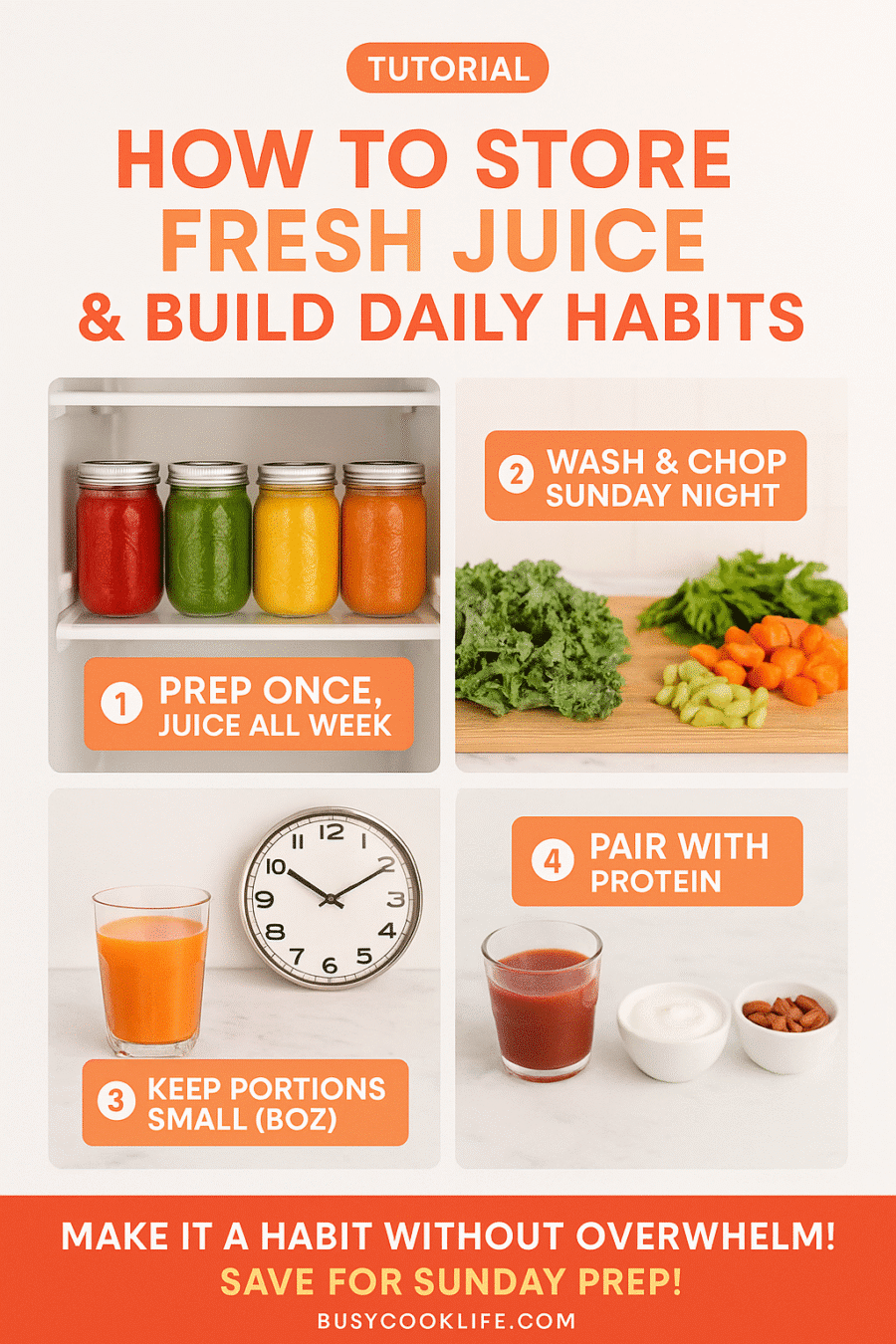
How to fit juice into your diet without a juice fast
I treat a fresh glass as a tiny side dish — not a full meal. That mindset keeps things practical and steady. Juice can add vitamins and flavor. It shouldn’t be a replacement or a crash plan.
Snack, side, or breakfast boost: choose your moment
I pick a moment that makes sense: a breakfast boost, a midmorning snack, or a pre-walk sip. Small portions work best—think 8 ounces or less. That helps your body handle natural sugars and keeps energy even.
Pairing juice with protein and fiber for balance
Pair it. Eggs, yogurt, or a handful of nuts turn a bright cup into a balanced mini-meal. Protein and fiber slow absorption and calm your system. This is a simple way to get the benefits without a strict plan.
- I use juice as a side—like a salad in a glass—not my whole meal.
- I skip the juice fast trend; science doesn’t back long cleanses and they don’t fit my routine or weight loss goals.
- I reach for veggie-forward blends when I want lighter energy; save the fruitier recipe for busier days.
- I listen to hunger cues—juice complements, it doesn’t replace real food.
- Consistency beats perfection—small, steady habits are the easiest way to see results.
“A small, smart sip plus a protein makes my mornings calm and useful.”
Internal links you’ll love: quick mug recipes when life’s busy
I keep a short list of one-mug meals that slide perfectly next to a small glass. They take two minutes and give real protein, so I don’t crash mid-morning.
Cozy sips and fast mugs
My go-to: the 2-minute Egg Mug on BusyCookLife.com — fast protein, zero stress. This one’s saved my week more than once.
When I want something more indulgent, I make the Brownie-in-a-Mug from BusyCookLife.com and sip a green juice on the side. Joy and greens together.
- I pair a small juice with quick protein so I don’t crash.
- I swap flavors to match the mug — citrus with the egg mug, berry-beet with the brownie.
- One mug, one glass, tiny cleanup — win for busy cooks.
- I put these links in my meal plan so I can tap and make without thinking.
I like this approach because it’s an easy way add steady fuel next to a bright sip. Little swaps keep it fun and practical, and your body thanks you.
“Pick one mug recipe and one juice this week—you’ve got this.”
| Mug | Quick pairing | Why it works |
|---|---|---|
| Egg Mug (BusyCookLife) | Citrus-based juice | Protein + vitamin C steadies energy after a quick start |
| Brownie-in-a-Mug (BusyCookLife) | Berry-beet or berry juice | Satisfying treat plus antioxidants keeps cravings tame |
| Toast & nut butter mug combo | Cucumber-mint or light green juice | Fiber, fat, and hydration — gentle on the body |
| Yogurt bowl in a mug | Pineapple-spinach sip | Protein and greens add balance and vitamins |
Safety notes for people managing blood sugar and special diets
When your system needs steady fuel, small choices around portion and pairing matter more than big rules. A quick reminder: without fiber, sugars in liquid absorb faster. That can nudge blood sugar upward more quickly than whole foods.
Talk to a registered dietitian for a plan that fits you
I’m not a clinician. If you manage blood sugar or follow a special diet, a registered dietitian can help you build a safe, tasty plan. They tailor portions, pairings, and timing to your needs.
- I keep portions small and watch how my blood sugar responds after a cup.
- Pair a juice with protein or fiber to slow absorption and steady blood sugar levels.
- I favor more vegetables and fewer sweets when I track spikes.
- I sip slowly and note how I feel 30–60 minutes later.
- Prune juice has a bit more fiber than most, but most blends lack fiber—plan accordingly.
- I save richer, fruit-forward blends for active days and pair them with a snack.
- Talk with a pro: a dietitian will adapt a plan that fits your health and daily routine.
“A few gentle tweaks—smaller pours, a protein bite, and a pro’s guidance—keep the benefits and cut surprises.”

Conclusion
A small glass can be a gentle, steady way to add nutrients and color to your day.
I love how mixed drinks support nutrient intake while staying simple. Veggie-forward blends help manage sugars and keep energy steady.
One small action: pick one recipe, shop once, and try a cup tomorrow. Seal jars tight and drink within 24–48 hours for best freshness.
These tiny habits bring real benefits to your body. Keep it playful—swap ingredients, taste as you go, and save favorites to make them your rhythm.
Thanks for standing in my cozy kitchen with me—glass in hand, day looking brighter.
FAQ
What makes these easy juicing recipes good for digestion?
I focus on a balance of vegetables with a little fruit to keep sugars steady and pack vitamins, minerals, and antioxidants into each glass. Ingredients like ginger, aloe, and apple pectin help soothe the gut and feed good bacteria while spinach, cucumber, and celery add hydration and micronutrients without extra sugar.
Will drinking fresh juices spike my blood sugar?
Not if you build them smart. I pair lower-sugar veggies with a small amount of fruit—green apple or a wedge of pineapple—for natural sweetness and fiber-friendly pectin. Also, keep portions moderate and pair a juice with protein or fiber at meals to blunt any quick sugar rise.
How do I choose a juicer that fits my daily routine?
Think about time and cleanup. Cold-press (masticating) machines yield more nutrients and less foam but take longer to prep. Centrifugal juicers are fast and great for busy mornings. I picked a model I actually use—easy to clean, compact, and quick to assemble.
Can I make juices ahead and store them safely?
Yes—if you chill them fast. Store in airtight glass bottles and keep them in the fridge for up to 24–48 hours. Cold-press juices hold better than centrifugal. Add a squeeze of lemon to slow oxidation and give them a good shake before drinking.
What are the top ingredients I should keep on hand?
I always have ginger, green apples, spinach, cucumber, carrots, beetroot, lemon, and fresh mint. They mix well across recipes and cover hydration, antioxidants, and flavor balance. Aloe vera is great to soothe the gut if you like it mild.
Will drinking juice help with weight loss?
Juice can support a lower-calorie pattern if used as a smart snack or meal boost rather than a sole food source. It’s great for adding vitamins and minerals, but pair juices with whole foods, protein, and fiber to feel full and avoid overeating later.
How can I keep juices from tasting too sweet or too bitter?
Balance is key. If it’s too sweet, add cucumber, celery, or a handful of spinach. If it’s bitter, a small apple or a splash of pineapple and a pinch of salt can mellow things. Fresh mint or ginger adds brightness and helps balance flavors.
What about using pulp—should I throw it away?
Don’t toss it! I use leftover pulp in muffins, soups, veggie burgers, or toss it into smoothie bowls. It’s a great way to add fiber back into your diet and cut waste—win-win.
Are there any safety notes for people with special diets or diabetes?
Absolutely—talk to a registered dietitian or your healthcare provider before adding regular fresh juices if you manage blood sugar or follow a strict diet. They can help you fit juices into a plan that keeps levels steady and supports your goals.
How often should I drink these juices to see benefits?
I aim for a few times a week as a boost—morning pick-me-ups, a pre-workout sip, or a midafternoon refresh. Consistency matters more than frequency. Rotate ingredients to keep a variety of nutrients coming in.
Can kids drink these juices too?
Yes—most of my blends are kid-friendly when you dial down strong flavors like raw beet or too much ginger. Use more apple or cucumber for sweetness and serve small portions alongside a protein-rich snack to keep them satisfied.
Are these juices good for immune support?
Many are. Ingredients like citrus, spinach, pineapple, and beetroot bring vitamin C, zinc-supporting minerals, and antioxidants that help the immune system. Pair them with a balanced diet to get the best benefits.
What’s a simple first juice to try if I’m a beginner?
Start with my Green Apple Spinach Booster: spinach, green apple, pineapple, and lemon. It’s bright, not too sweet, and easy to make—plus ginger or fresh mint twists are optional if you want extra zing.
Can these drinks replace a meal or be part of a juice fast?
I don’t recommend using them as sole nutrition for long stretches. They’re great as a meal supplement or occasional meal replacement when you add protein and fiber elsewhere. If you’re considering a juice fast, consult a healthcare pro first.
How do I keep flavors interesting so I don’t get bored?
Rotate your greens, swap fruits, and add new boosters—ginger for heat, mint for freshness, lemon for brightness, or a pinch of turmeric. I change one ingredient each week to keep things fun and varied.
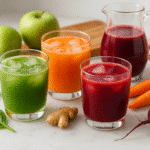
Easy Juicing Recipes for Better Gut Health
- Prep Time: 5
- Total Time: 5
- Yield: 2 1x
- Category: Beverages
- Method: Juicing
- Cuisine: American
Description
A bright, refreshing green juice that combines immune-boosting spinach with the natural sweetness of green apple and tropical pineapple. Perfect for busy mornings when you need a quick vitamin C boost that actually tastes good. This vibrant blend supports digestive health and provides essential nutrients without the heavy, earthy taste of traditional green juices.
Ingredients
2 cups fresh spinach leaves, washed and stems removed
1 medium green apple, cored and quartered
3–4 fresh pineapple chunks (about 1/2 cup)
1/2 fresh lemon, juiced
Optional: 1/2 inch fresh ginger root for bloat relief
Optional: 4-5 fresh mint leaves for cooling finish
Instructions
1. Wash all fresh produce thoroughly under cold running water
2. Core and quarter the green apple, leaving skin on for extra nutrients
3. Cut fresh pineapple into small chunks if using whole fruit
4. Feed spinach leaves through juicer first, followed by apple quarters
5. Add pineapple chunks and process through juicer
6. Stir in fresh lemon juice to prevent oxidation and add bright flavor
7. Add optional ginger or mint if desired for extra health benefits
8. Pour over ice in a tall glass and serve immediately for best nutrition
9. If storing, transfer to airtight glass jar and refrigerate up to 24 hours
Notes
For best results, drink immediately after juicing to maximize vitamin content and prevent oxidation. The natural sugars from apple and pineapple balance the mineral taste of spinach, making this an ideal beginner green juice. Store any leftover pulp in the refrigerator and add to smoothies, soups, or baked goods for extra fiber. This recipe works well as a morning energy boost or pre-workout drink when paired with a small protein snack like Greek yogurt or nuts to stabilize blood sugar levels.
Nutrition
- Serving Size: 8
- Calories: 95
- Sugar: 18
- Sodium: 25
- Fat: 0.5
- Saturated Fat: 0.1
- Unsaturated Fat: 0.3
- Trans Fat: 0
- Carbohydrates: 24
- Fiber: 1
- Protein: 2
- Cholesterol: 0

